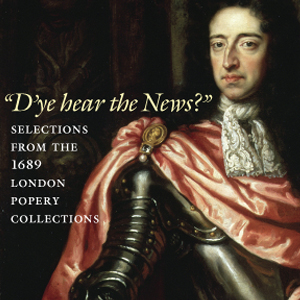D'ye hear the News? Selections from the 1689 London Popery Collections
Subscribed: 1Played: 5
Subscribe
© Creative Commons Attribution-NonCommercial-ShareAlike 3.0 license
Description
Of the many sounds one might have encountered in London during the late seventeenth century, one undoubtedly would have been singing. The decade bounded by the Exclusion Crisis and the Glorious Revolution is noted for the political nature of many of its broadside ballads, and into this milieu, sometime during the first weeks or months of 1689 there appeared, anonymously, a series of four verse books having anti-popery as their organizing theme, known as the Popery Collections. The texts came from different sources, yet converged and gained popularity in London at this particular time, making it possible to propose them as a representative distillation of how the myriad inputs of a generation of anti-Catholic rhetoric were being received by the population at the height of the winter’s crises. That the songs functioned as more than mere entertainment and served a vital role in communications is manifest right from the first words of the first song in the first Collection: “D’ye hear the News?”
The musical settings in this new volume come from composers noted and obscure, ranging from arrangements by Henry Purcell and Captain Simon Pack in music books published in the late 1680s by the noted musical publishers of the Playford family, to tunes used just four years earlier in a 1685 edition of “Loyal” songs published by Catholic printer Nathaniel Thompson. This is not unusual; certain tunes were repeatedly used for competing political causes throughout the early modern period and beyond, and Whig and Loyal balladmongers were in furious dialogue with one another during this period. And a “high/low” tune dichotomy reflects the wide range of settings where these songs would have been consumed – from the rarified, exclusive setting of private salons graced by the strains of Purcell, to robust bellowing in London’s most squalid precincts by the rudest sort of ballad vendor – suggesting that song culture crossed social as well as political barriers, allowing all members of society to participate in the discourse, regardless of station, access, or literacy. To hear these texts sung is to reanimate them as their original authors intended, presenting them as they were appreciated by a London audience overwhelmed by the sound and fury of the Glorious Revolution.
Sponsored by USC-Huntington Early Modern Studies Institute and Yale University Press MUSIC PERFORMED BY Members of the USC Thornton Baroque Sinfonia
The musical settings in this new volume come from composers noted and obscure, ranging from arrangements by Henry Purcell and Captain Simon Pack in music books published in the late 1680s by the noted musical publishers of the Playford family, to tunes used just four years earlier in a 1685 edition of “Loyal” songs published by Catholic printer Nathaniel Thompson. This is not unusual; certain tunes were repeatedly used for competing political causes throughout the early modern period and beyond, and Whig and Loyal balladmongers were in furious dialogue with one another during this period. And a “high/low” tune dichotomy reflects the wide range of settings where these songs would have been consumed – from the rarified, exclusive setting of private salons graced by the strains of Purcell, to robust bellowing in London’s most squalid precincts by the rudest sort of ballad vendor – suggesting that song culture crossed social as well as political barriers, allowing all members of society to participate in the discourse, regardless of station, access, or literacy. To hear these texts sung is to reanimate them as their original authors intended, presenting them as they were appreciated by a London audience overwhelmed by the sound and fury of the Glorious Revolution.
Sponsored by USC-Huntington Early Modern Studies Institute and Yale University Press MUSIC PERFORMED BY Members of the USC Thornton Baroque Sinfonia
22 Episodes
Reverse
Comments






